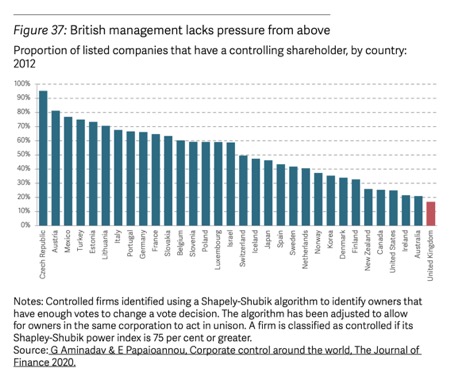Michael Pascoe: Business too busy whingeing to lift productivity


The business lobby is failing to invest in improving productivity, Michael Pascoe writes.
As certain as death and taxes – well, death anyway – the business lobby has reacted to Labor’s “same work, same pay” bill by claiming the Four Horsemen are riding in Canberra and the earth shall split asunder, spewing forth toads and serpents and so on.
That’s a lot easier than admitting Australia suffers from dud corporate leadership.
The lobbyists’ hysteria coincides with a British economic stagnation study, key aspects of which fit Australia like a glove despite our lack of a Brexit disaster.
Specifically, the Economy 2030 report targets low rates of investment (cue Australian non-mining industry) and underperforming management (ditto).
What’s particularly interesting and relevant here is that the study sheets home that underperformance to weak structures of corporate governance stemming from a high percentage of foreign-owned firms and a low percentage of listed companies that have a controlling shareholder to oversee management strategy, an “owner voice” to push management to do more than just manage.
At the same time, there is a lack of “worker voice” putting pressure on management from below.
Pursuit of profits
While highly-paid business lobbyists go through their usual chant of “higher wages will kill the economy”, the sub-text is that higher wages might make it more challenging for comfortable Australian businesses to forever increase profits to earn higher bonuses for C-suite executives.
What the Productivity Commission, the RBA and just about everyone except the business lobby admit from time to time is that higher wages stemming from a shortage of workers “encourages” business to invest more to improve productivity.
But it’s easier just to suppress wages if you can get away with it, as Australian business generally did with the explicit help of government during the Lost Decade.
The business lobby reaction to Labor’s Closing the Loopholes part 1 passing the Senate bordered on caricature.
“Are they trying to serve the Australian economy, the Australian people, or just interested in rewarding their union mates?” asked the Australian Chamber of Commerce and Industry’s Andrew McKellar.
“The bill will hurt industry, undermine productivity and result in few job opportunities as well as higher costs that will potentially be passed on to consumers,” said the Australian Industry Group.
In the process, the Business Council of Australia et al effectively admitted their members had been using labour hire outfits to undercut wages. It’s so much easier than investing.
Management underperforming
While the lobbyists were fulminating, I was reading an article by Professor Adam Tooze on the Economy 2030 Inquiry he contributed to.
“To put capital and labour to work productively requires good management. And though there are many British firms which are well run, the UK has a long tail of underperformance,” he wrote.
“Assuming that owners are in general interested in maximising returns, a long tail points to weak structures of corporate governance. What is particularly striking in the UK case is the extent of foreign ownership – foreign ownership of UK public firms rose from just over 10 per cent in 1990 to over 55 per cent in 2020 – and the extent to which firms lack a single controlling share owners, who would be in a position to oversee management strategy and reap the full rewards of success.”
As so often the case, a graph told the story. That’s the UK at the very bottom – and Australia is sitting right next to it.
“Furthermore, as the report notes it is not just capital that is poorly represented in corporate Britain.
“The UK stands out even more internationally when we recognise that the lack of ‘owner voice’ is matched by a lack of worker voice, so that pressure from below for managers to invest for the long term is unable to compensate for the lack of such pressure from above.”
“In so far as anyone has agency it would seem to be a largely unconstrained managerial class, who to judge by the data are doing a thoroughly mediocre job.”
Box-ticking bluff
Corporate governance in Australia has largely descended into a box-ticking exercise that blows out the size of annual reports with fluff and puff without adding substance in driving the managerial class beyond ticking their own boxes to receive the maximum bonus for what are mostly short-term KPIs.
This aspect of the Economy 2030 Inquiry complements a report by funds manager James Montier several years ago that demonstrated private companies have much higher investment rates than public companies.
The Montier report was primarily focused on how “shareholder value” – alias the share price – had undermined long-term investment and underlying corporate performance.
The easy path to higher “shareholder value” in the brief time most CEOs hold down their jobs is by cutting costs and not competing too hard in the relatively comfortable mix of oligopolies that characterises much of Australian business.
As for the branch offices of major foreign businesses, well, branch offices aren’t famous for rocking boats. They rarely get first or second bite of the investment cherry.
Not all branch offices, not Australian companies, but enough to closely reflect the British experience of doing a “thoroughly mediocre job” of investment and productivity growth.
But, hey, let’s blame employees for daring to want the same pay for doing the same job.









